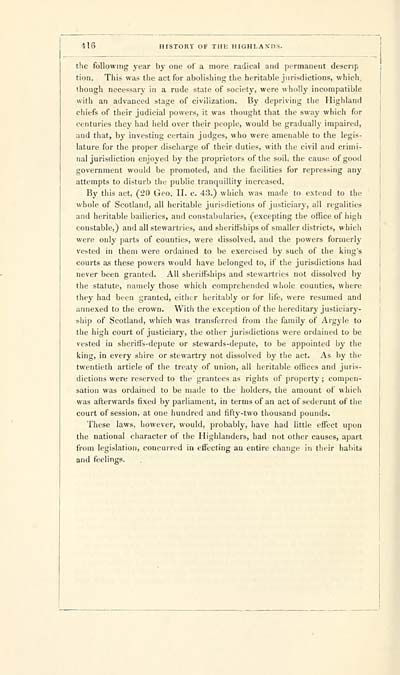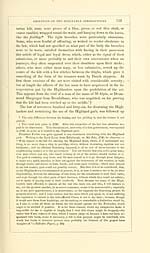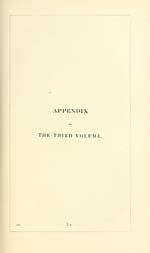Download files
Complete book:
Individual page:
Thumbnail gallery: Grid view | List view

416 HISTORY OF THB HIGHLANDS.
the following year by one of a more radical and permanent descnp
tion. This was the act for abolishing the heritable jurisdictions, which,
though necessary in a rude state of society, were wholly incompatible
with an advanced stage of civilization. By depriving the Highland
chiefs of their judicial powers, it was thought that the sway which for
centuries they had held over their people, would be gradually impaired,
and that, by investing certain judges, who were amenable to the legis-
lature for the proper discharge of their duties, with the civil and crimi-
nal jurisdiction enjoyed by the proprietors of the soil, the cause of good
government would be promoted, and the facilities for repressing any
attempts to disturb the public tranquillity increased.
By this act, ('20 Geo. II. c. 43.) which was made to extend to the
whole of Scotland, all heritable jurisdictions of justiciary, all regalities
and heritable bailieries, and constabularies, (excepting the office of high
constable,) and all stewartries, and sheriffships of smaller districts, which
were only parts of counties, were dissolved, and the powers formerly
vested in them were ordained to be exercised by such of the kings
courts as these powers would have belonged to, if the jurisdictions had
never been granted. All sheriffships and stewartries not dissolved by
the statute, namelj' those which comprehended whole counties, where
they had been granted, eitlur heritably or for life, were resumed and
annexed to the crown. With the exception of the hereditary justiciary-
ship of Scotland, which wa^ transferred from the family of Argyle to
the high court of justiciary, the other jurisdictions were ordained to be
vested in sheriffs-depute or stewards-depute, to be appointed by the
king, in every shire or stewartry not dissolved by the act. As by the
twentieth article of the treaty of union, all heritable offices and juris-
dictions were reserved to the grantees as rights of property ; compen-
sation was ordained to be made to the holders, the amount of which
was afterwards fixed by parliament, in terms of an act of sederunt of the
court of session, at one hundred and fifty-two thousand pounds.
These laws, however, would, probably, have had little eflJect upon
the national character of the Highlanders, had not other causes, apart
from legislation, concurred in effecting an entire change in their habits
and feelings.
the following year by one of a more radical and permanent descnp
tion. This was the act for abolishing the heritable jurisdictions, which,
though necessary in a rude state of society, were wholly incompatible
with an advanced stage of civilization. By depriving the Highland
chiefs of their judicial powers, it was thought that the sway which for
centuries they had held over their people, would be gradually impaired,
and that, by investing certain judges, who were amenable to the legis-
lature for the proper discharge of their duties, with the civil and crimi-
nal jurisdiction enjoyed by the proprietors of the soil, the cause of good
government would be promoted, and the facilities for repressing any
attempts to disturb the public tranquillity increased.
By this act, ('20 Geo. II. c. 43.) which was made to extend to the
whole of Scotland, all heritable jurisdictions of justiciary, all regalities
and heritable bailieries, and constabularies, (excepting the office of high
constable,) and all stewartries, and sheriffships of smaller districts, which
were only parts of counties, were dissolved, and the powers formerly
vested in them were ordained to be exercised by such of the kings
courts as these powers would have belonged to, if the jurisdictions had
never been granted. All sheriffships and stewartries not dissolved by
the statute, namelj' those which comprehended whole counties, where
they had been granted, eitlur heritably or for life, were resumed and
annexed to the crown. With the exception of the hereditary justiciary-
ship of Scotland, which wa^ transferred from the family of Argyle to
the high court of justiciary, the other jurisdictions were ordained to be
vested in sheriffs-depute or stewards-depute, to be appointed by the
king, in every shire or stewartry not dissolved by the act. As by the
twentieth article of the treaty of union, all heritable offices and juris-
dictions were reserved to the grantees as rights of property ; compen-
sation was ordained to be made to the holders, the amount of which
was afterwards fixed by parliament, in terms of an act of sederunt of the
court of session, at one hundred and fifty-two thousand pounds.
These laws, however, would, probably, have had little eflJect upon
the national character of the Highlanders, had not other causes, apart
from legislation, concurred in effecting an entire change in their habits
and feelings.
Set display mode to: Large image | Transcription
Images and transcriptions on this page, including medium image downloads, may be used under the Creative Commons Attribution 4.0 International Licence unless otherwise stated. ![]()
| Early Gaelic Book Collections > Ossian Collection > History of the Highlands and of the Highland clans > Volume 3 > (462) |
|---|
| Permanent URL | https://digital.nls.uk/79657966 |
|---|
| Description | Vol. III. |
|---|---|
| Shelfmark | Oss.249 |
| Attribution and copyright: |
|
| Description | Selected books from the Ossian Collection of 327 volumes, originally assembled by J. Norman Methven of Perth. Different editions and translations of James MacPherson's epic poem 'Ossian', some with a map of the 'Kingdom of Connor'. Also secondary material relating to Ossianic poetry and the Ossian controversy. |
|---|
| Description | Selected items from five 'Special and Named Printed Collections'. Includes books in Gaelic and other Celtic languages, works about the Gaels, their languages, literature, culture and history. |
|---|

